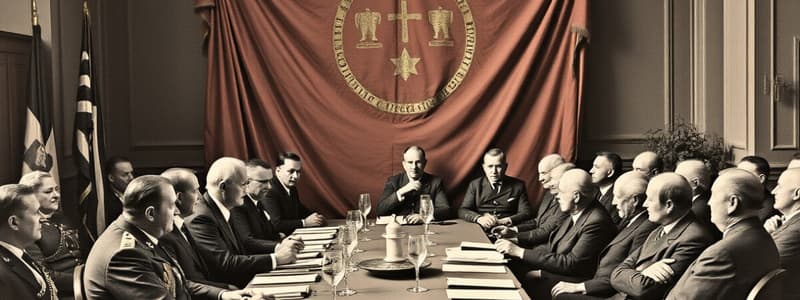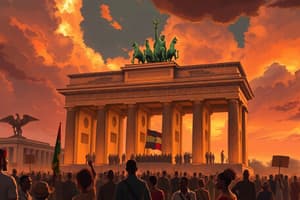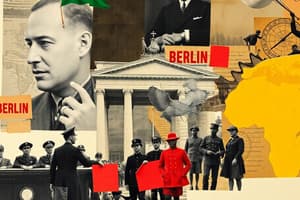Podcast
Questions and Answers
What is colonialism?
What is colonialism?
The policy or practice of a country installing a settlement of its people on foreign land, usually establishing political control for economic benefits.
What is imperialism?
What is imperialism?
The policy or action by which one country forcefully gains and keeps control of another country or territory, often for economic and political control.
What is a missionary?
What is a missionary?
A member of a religious group sent to perform ministry and spread their religion, often providing services such as education and healthcare.
What is social Darwinism?
What is social Darwinism?
What is nationalism?
What is nationalism?
What is a sphere of influence?
What is a sphere of influence?
What are raw materials?
What are raw materials?
What is a protectorate?
What is a protectorate?
What is effective occupation?
What is effective occupation?
What is the balance of power?
What is the balance of power?
What is 'the Other'?
What is 'the Other'?
What was the Berlin Conference?
What was the Berlin Conference?
When was the Berlin Conference held?
When was the Berlin Conference held?
Where was the Berlin Conference held?
Where was the Berlin Conference held?
Why was the Berlin Conference held?
Why was the Berlin Conference held?
How is the Berlin Conference an example of colonialism?
How is the Berlin Conference an example of colonialism?
What brought Europe to Africa?
What brought Europe to Africa?
How did European Nations claim Africa?
How did European Nations claim Africa?
What were the major problems with the Conference?
What were the major problems with the Conference?
How does nationalism for Europe play into the Berlin Conference?
How does nationalism for Europe play into the Berlin Conference?
How was nationalism of Africa affected by the Berlin Conference?
How was nationalism of Africa affected by the Berlin Conference?
Who is considered 'the Other' in the Berlin Conference?
Who is considered 'the Other' in the Berlin Conference?
How is power distributed in the Berlin Conference?
How is power distributed in the Berlin Conference?
Flashcards are hidden until you start studying
Study Notes
Key Concepts
- Colonialism: policy or practice of a country installing a settlement of its people on foreign land, often for economic benefits.
- Imperialism: policy or action by which one country forcefully gains and keeps control of another country or territory.
- Social Darwinism: theory that human groups and races are subject to the same laws of natural selection as plants and animals.
The Berlin Conference
- The Berlin Conference was a method of dividing the continent of Africa between the European Powers.
- Held from 1884-1885 in Berlin.
- Intended to reduce conflict between European Nations and discard the slave trade, but ultimately divided up Africa to the European Nations.
European Motivations
- Europe discovered expensive resources in South Africa and wanted to control the means of production such as labor, material, trade, and land.
- European Nations claimed African countries by telling other nations it was theirs and showing they could control the area they claimed (effective occupation).
Problems with the Conference
- Based on racist assumptions (Social Darwinism).
- Done for the benefit of Europeans, with no thought given to language or cultural groups in Africa when the division occurred.
- No African leaders were invited.
Nationalism and the Berlin Conference
- Nationalism in Europe played into the Berlin Conference, with Europeans believing they were superior and perfect compared to Africa.
- Nationalism of Africa was affected by the Berlin Conference, with Europe telling Africa that Europeans were better and that they should change to be more "civilized" like Europeans.
Power Dynamics
- Power was distributed by whoever conquered the land first by war.
- The concept of "effective occupation" allowed European countries to claim land and prove their ability to hold it.
Key Terms
- Sphere of Influence: a country or area that has power to influence or affect another country without actually having power.
- Protectorate: a country that is controlled or protected by another.
- Balance of Power: the equal distribution of power in a situation, which can be disrupted by too little or too much power.
- The Other: coming into contact with anyone different from one's self, in this case, Europeans viewing Africans as "the Other".
Studying That Suits You
Use AI to generate personalized quizzes and flashcards to suit your learning preferences.




